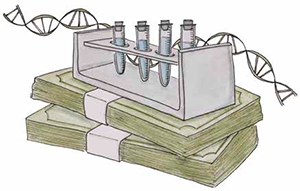
ARUP Leadership— The Pros and Cons: Should Hospitals Sell Their Labs?
Why are hospitals selling their labs to commercial vendors such as LabCorp and Quest?
S—Right now there is a lot of fear and uncertainty in the laboratory industry. Large commercial vendors are leveraging and capitalizing on this uncertainty and buying up hospital outreach programs and hospital labs.
J—They’re making promises about turnkey solutions that, in reality, provide more benefit to the commercial vendor than the hospital lab. This sudden infusion of money is often too hard to resist, given the pressure hospitals are under with declining reimbursement and narrowing margins.
"We can help laboratories quantify their short- and longterm value in terms of revenue potential and impact on patient care."
Julie Altwies, Chief Business Development Officer
S—The first few years may be good, but then these hospital labs are at the mercy of the vendor.
What is the value of keeping the lab in-house, from a financial perspective?
S—While outsourcing may provide an infusion of cash into a health system, it comes with crucial trade-offs. There is a financial advantage to keeping lab services in-house because a health system retains the ability to contain costs. As we move from a decades-old, fee-for-service model that emphasizes volume to a model that places importance on quality outcomes with value-based reimbursement, it is essential to ensure that patients get the right tests for the best medical outcomes at the lowest cost.
J—Commercial labs survive on volume; they must continue to grow revenue to keep stakeholders happy. Acquisitions and lab-management arrangements offer a quick way to achieve that goal. As more physician practices come under the umbrella of a health system, commercial labs risk losing those practices as clients unless they acquire or take over management of the health system lab.
S—Health systems, on the other hand, are committed to the mission of caring for patients and must consider overall costs, even if it means performing fewer tests in the laboratory.
J—Values are often misaligned when a health system sells its in-house laboratory.
From a patient-care perspective, what is the value of keeping lab services in-house?
S—It’s not just about cost. Selling your lab impacts patient care. To maintain the best patient care is to keep the testing as close as possible to the patient. Oftentimes when a lab is sold, testing goes to other sites, turnaround times increase, and it doesn’t allow for close focus on utilization management or the development of lab practices to improve patient care. Most people overlook the fact that the laboratory has more touchpoints with patients than any other area. While they may make up only 3 to 4 percent of the hospital’s overall costs, lab services contribute to more than 80 percent of the information in a patient’s EMR [electronic medical record]. This alone is a compelling reason for a hospital to maintain control of its laboratory services.

J—Good patient care relies on lab services that are high quality, easily accessible, and reported quickly. When specimens are lost or compromised, the impact on patients can range from the inconvenience of having specimens recollected or cancellation of an outpatient visit to potential delays in diagnosis and treatment.
S—Once your lab operations are off-site, it is very difficult to change ordering patterns and communicate with clinicians about appropriate testing. You lose that close communication that makes a healthcare team effective. The lab and pathologists are part of that team.
J—Patient satisfaction is a key metric for health systems. Selling your lab means turning your brand over to an outside entity. Internal control over testing quality and customer service is turned over as well and may impact patient satisfaction.
What should lab personnel know about the prospect of their labs being sold?
S—The decision to outsource or sell is often made at the executive level, and laboratory personnel are sometimes the last to find out. Even when they do know, laboratorians may not fully understand the value of the lab from a financial perspective and can’t communicate their value to the executives.
Often, nonlaboratory executives see lab testing as just another commodity without fully understanding what value their lab brings to the overall healthcare organization.
J—When labs are sold, employees are often let go or must reapply for their positions. Management often gets replaced. What can lab management do?
J—Be proactive. Laboratory professionals need to articulate the value the lab delivers to the health system beyond test results. Develop a laboratory value proposition and make sure members of the health system executive team hear it. The key is to connect the dots between the laboratory, providers, and their patients in ways that drive outcomes and cut costs.
S—Also, make sure you are represented on patient-care teams, where decisions are being made collectively by a variety of providers.
How are hospital physicians affected?
S—Physicians depend on quality lab tests that provide results they can trust. In organizations with laboratory stewardship programs, it’s not uncommon for the lab staff to work with clinicians on the front end to help ensure appropriate tests are ordered, and then on the back end by assisting with proper interpretation of test results.
J—Commercial labs are volume driven and would find it difficult to embrace the services of a lab stewardship program. Performing fewer tests does not support the commercial lab model.
In order to keep their stakeholders happy, commercial labs are incentivized to increase revenue by growing volume. Therein lies the difficulty with commercial labs offering lab stewardship services. They may try to talk the talk, but they don’t walk the talk.
"Our roots are as an academic medical entity, so our values are to help and to share knowledge. We want a partnership with—not ownership of—our clients’ laboratories."
Sherrie Perkins, MD, PhD, ARUP CEO
How difficult is it for a hospital to buy back its lab?
J—Very difficult. For one, the hospital cannot compete for outreach business for the length of the contract—typically five years. It is costly and complex to bring these services back in house once they’ve been sold. Once the contract is up, the hospital must actively market and sell its services to community-based physicians, a process that typically requires a year to 18 months before a new contract is secured.
From a management perspective, the commercial lab will downsize the lab staff, letting experienced and valuable personnel go. To find trained personnel and restaff the laboratory is difficult. The cost of “lost personnel” is undeniable, with long-term implications. Last, the disruption in reagent contracts or rental agreements means renegotiating agreements at current market rates.
How can ARUP help increase the value of hospital labs?
J—Hospital labs are inherently valuable, but this value is a well-kept secret in many organizations. We can help laboratories quantify their short- and long-term value in terms of revenue potential and impact on patient care.
S—We can provide decision support on many different levels and help our clients improve operational efficiencies, grow outreach margins, or engage in laboratory stewardship to address and reduce misutilization.
J—It’s about giving recommendations that are both actionable and quantifiable.
S—Our roots are as an academic-medical entity, so our values are to help and to share knowledge. We want a partnership with—not ownership of—our clients’ laboratories.

















 HOME
HOME